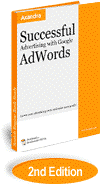This site is for sale,
Learn More
Google AdWords
Choosing Your Keywords
By Esoos Bobnar
www.searchenginehelp.com
Originally Published: January 2005
Continued From:
<<< How Smart Choices Can Get You Top Placement For Less!
Choosing Your Keywords
The first critical step to creating a smart AdWords campaign is to create a list of effective keywords. The importance of this step cannot be overstated. Do it correctly, and you're well on your way to generating profits. Do it wrong, and you might as well go home - because nothing else in your campaign is going to work.
What does it mean for a keyword (or keyphrase) to be effective? It really boils down to one thing. On average, the amount of value that the keyword generates per click must be greater than that keyword's cost per click. In other words, that keyword needs to be producing profits.
A keyword must also generate enough clicks to keep it from being disabled by Google. If your keyword does not maintain a CTR of at least 0.5%, that keyword will be disabled. This means that once a thousand people have searched for your keyword and have seen your ad, at least five of those visitors will need to have clicked on your ad in order for that keyword to stay active. If not, Google disables that keyword and your ad no longer appears when someone uses it in a search. (There are ways to re-enable disabled keywords which we'll discuss later). This is another reason why your keyword must be relevant to the ad you're running.
To find effective keywords, it's best to extensively brainstorm the process. You'll eventually want to track down every possible search query that someone might use when looking for the products or services your company offers. Here are three of the top tools geared to help you do just that:
the WordTracker keyword tool
(
http://www.wordtracker.com/),
the Google AdWords Keyword Tool
(https://adwords.google.com/select/KeywordSandbox),
and the Overture Keyword Selector Tool
(http://inventory.overture.com/d/searchinventory/suggestion/)
These tools can supercharge your keyword brainstorming process and, combined with the following
Keyword-Building Tips, will help you generate your optimal keyword list:
1. Put Yourself in Your Customer's Shoes.
What keywords would you use to find your product? Talk to people who might represent a typical customer and ask them to do a search for what you sell. If you're selling a consumer product, such as cell phones, then friends and family could help in this regard. Sit down with them at a computer, ask them to find your products or services, and see what searches they do. You may discover a keyword or group of keywords your competitors have overlooked. This could mean cheap clicks since there won't be anyone for you to engage in a bidding war with.
Remember to keep a customer's perspective. Unless you're selling to insiders within your own industry, try to avoid industry jargon. Think about words and phrases that real customers, not industry insiders, would use in a search.
On the other hand, if you are selling to insiders, then by all means, jargon away! If you're hired to run a campaign for an industry you're unfamiliar with, you should study the trade magazines to familiarize yourself with industry jargon and catch-phrases. You can also mine the indexes and glossaries of books about the topic you'll be placing ads for, as well as browse internet forums dedicated to the particular industry or hobby you're targeting.
Continued:
Cover All Your Keyword Variations >>>
Continued From:
<<< How Smart Choices Can Get You Top Placement For Less!
Editor's Note:
See also:
Successful Advertising with Google AdWords
eBook
Copyright 2005 by Planet Ocean, reprinted with permission.
Site Promotion Articles Indexes:
|
![]()
